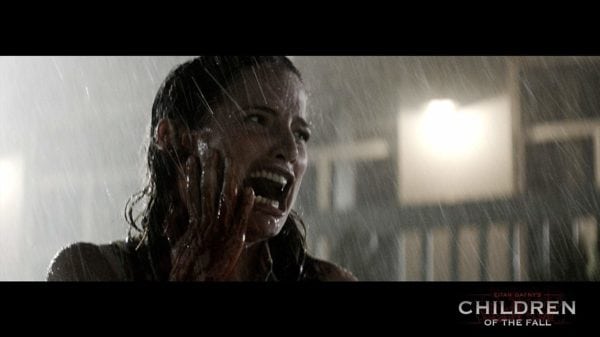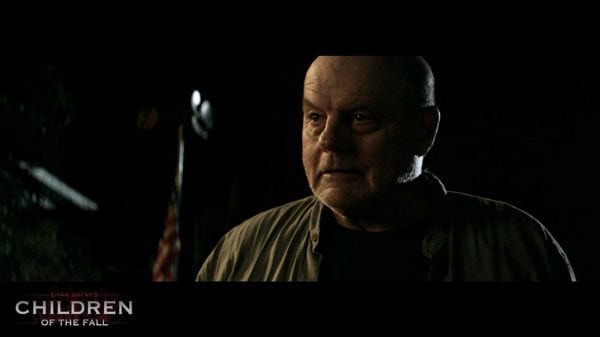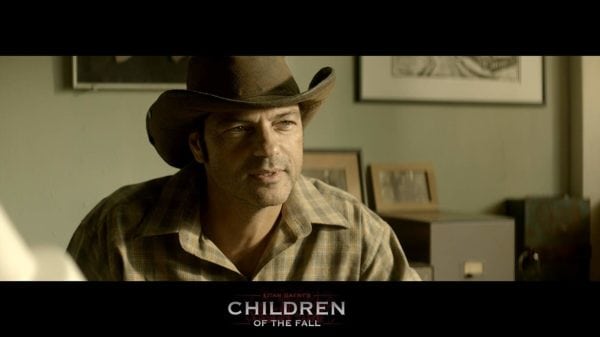Children of the Fall, 2017.
Directed by Eitan Gafny.
Starring Noa Maiman, Aki Avni, Yafit Shalev, Tamara Klingon, Danny Leshman, and Michael Ironside.
SYNOPSIS:
A young woman looking to escape her past flees to Israel in 1973. On the eve of Yom Kippur, she and other young immigrants encounter more hostility than they could have imagined.

Children of the Fall is almost a unique slasher film. Adhering to tropes well established in the genre, it still takes its opportunities to break format.
As the film opens, we’re thrown into a scenario where a young American woman named Rachel Strode (Noa Maiman) has fled to Israel to escape a dark past with her Jewish father that is never properly expounded upon. She arrives at a kibbutz (an Israeli communal settlement) to work and build a new life for herself in the land of her father. She befriends the other non-Jewish members of the kibbutz (her lack of a Jewish mother and inability to speak much of the Hebrew language leaving her as much an outsider as they are), as well as the leadership of the kibbutz, who are happy to hear she is considering converting to Judaism. On the evening of Yom Kippur, she and the other outsiders are discovered partying by Yaron (Aki Avni), one of the devout leaders who had previously defended the group in an altercation with IDF soldiers. Yaron expresses disappointment in the group’s disrespectful behavior on one of the Jewish faith’s most holy days and disperses the group. As the night progresses, each of the group is picked off by our anonymous slashers.
Almost every second of the film is predictable, but that doesn’t necessarily work against it. A slasher film fan comes for a slasher film, and this is a mostly effective one. It does a good job of building tensions in the places where you want that to happen. Do you know that the young couples having sex and the girl in the dark kitchen alone are about to die? Of course. But the film plays with that knowledge to further draw you into to the scene. It’s not a unique approach, but it is executed as well here as it is in the best Hollywood slashers, and the gore effects are about as well executed as on larger budgeted films.

The overall quality of the film is lacking. From amateurish shots and baffling lens changes, to actors who may as well have carried copies of the script around throughout the movie (with the exception of an under-utilized Michael Ironside a competent performance from Avni), it’s far from a polished film. This is a B-level horror flick at best. You won’t forget that at any point, even if the filmmakers might have hoped that you would. The film attempts to be political, as the plot revolves around killers who are wish to cleanse Israel of perceived outsiders. I’m no expert in Israeli domestic affairs, but from what I know the ideas presented here in the context of the early 70s are just as relevant today. I won’t say that a slasher flick isn’t the place to explore these ideas. That would be completely untrue. Bringing a charged political viewpoint into well-tread genre fiction can be a fantastic formula, and has been successful many times before. But the attempts to build drama here are ineffectual, as the actors barely have the chops to be believable characters, let alone sympathetic. Deep character work isn’t expected of the slasher genre, but purely archetypal characters usually can’t bear dramatic weight.
I will admit that it is entirely possible that these intentions are misread, and that filmmaker Eitan Gafny simply found the political tensions present to be fertile ground for a horror film. If that’s the case, we could have done without a couple of the speeches, since the film’s runtime pushes two hours; a heavy burden for any independent genre film.
The climax of the film is actually pretty refreshing for the genre, as it drops the slasher tropes and takes on the tone of a thriller. The killings are interrupted as the Yom Kippur/October War erupts, and everyone is preparing for battle under heavy bombing. Still, our now revealed killers pursue Rachel in the blazing sun. She flees to the train tracks, which she had previously been informed were off limits, and discovers a train car full of the decomposing corpses of past victims. The politics are put on front street here, before the conflict is finally put to rest by a stray bomb.

The Halloween and John Carpenter references are really on the nose throughout the film. The revelation of the main character’s last name being “Strode” is a bit of a cringer. The strangely familiar character of Bobby (Danny Leshman) is also puzzling for anyone familiar with The Cure, and probably more so for anyone who isn’t. Is he supposed to be a young Robert Smith? What’s the point of that weird bootleg rendition of “Lovesong” he sings? Why do we have to put up with that twice, in the middle of the movie and in the credits? Is it a joke? It’s not very funny.
Ultimately, Children of the Fall is an effective slasher film that attempts to bring a little bit more to the genre. As a passive fan of the genre, I personally had fun watching, but I can’t help but feel a little disappointed after being teased with more thought-provoking concepts, and underwhelmed with the overall execution.
Flickering Myth Rating – Film: ★ / Movie: ★ ★ ★
Allen Christian – @FourColorFilm












